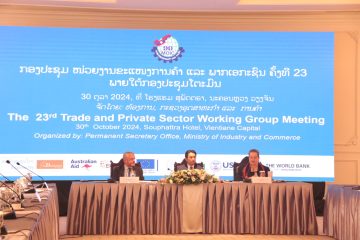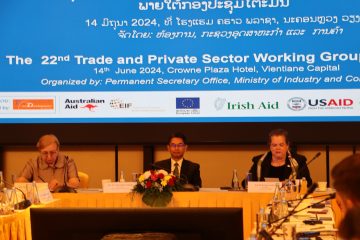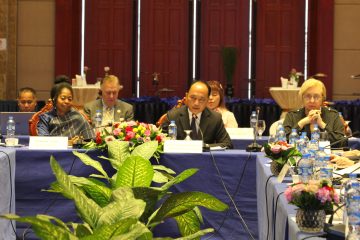Government, Development Partners, and Private Sector Discuss Medium Term Trade and Private Sector Development Priorities
Vientiane Capital, 10 November 2021. Ministry of Industry and Commerce (MOIC) and Development Partners organized the 18th Trade and Private Sector Working Group (TPSWG) meeting at Crown Plaza Hotel, Vientiane Capital, in a hybrid setting. The meeting was co-chaired by H.E. Dr. Khampheng Saysompheng, Minister of Industry and Commerce, H.E. Ms. Ina Marciulionyte, Ambassador of the European Union Delegation to Lao PDR, EIF Donor Facilitator, and H.E. Mr. Paul Kelly, Australian Ambassador to Lao PDR. More than 150 participants representing line ministries, embassies, development partners, domestic and foreign business community virtually participated in this meeting.
The meeting discussed key findings and recommendations from the World Bank’s Lao PDR Country Economic Memorandum (CEM) and MOIC’s Diagnostic Trade Integration Study (DTIS), drew lessons from two ongoing private sector/SME support initiatives, namely Supporting Business Recovery through Matching Grant Scheme under the Business Assistance Facility (BAF) of the Lao Competitiveness and Trade Project (LCTP); and Improving business environment through public private dialogue under the Lao Business Forum (LBF).
In his opening remarks, H.E. Minister Khampheng Saysompheng stressed the importance of improving business environment to create favorable conditions to promote post pandemic economic recovery. The Minister said that we all know that evidence on policy implementation on the ground indicates that our trade and private sector development policies are not always implemented as envisioned and do not always achieve the intended outcomes. Policy and implementation gap are attributed to several factors, including inappropriate policy design, lack of effective implementation arrangement or lack of necessary human and financial resources. However, many noted that recent policy reforms represented sound progress in improving the enabling environment, but that implementation remained problematic. This suggests that the answer to improving investment climate does not always lie in new policies, laws, or regulations, but rather in focusing on better implementation.
H.E. Mr. Paul Kelly, Australian Ambassador to Lao PDR as one of the co-chairs of the sector working group highlighted the social and economic impact of the ongoing COVID-19 pandemic in the country and the importance of the private sector as engine for medium- and long-term economic recovery in his opening remarks. H.E Ambassador concluded his remarks by stressing the importance of having clear and consistent message on key strategy to promote inclusive and sustainable economic growth through economic diversification by leveraging its strengths such as natural resource wealth, a young population, and its unique geographic location; complimenting its new infrastructure with policy reforms; and adopting the trade private sector development Roadmap as result of the DTIS Update.
The meeting divided into two main sessions. Two topics were discussed in each session. The first topic on Lao PDR CEM was jointly presented by WB Senior Economists- Melise Jaud and Kim Edward, who discussed key challenges facing the Lao economy and proposed recommendations to restore macro-fiscal stability and improve competitiveness of the agriculture, manufacturing, and services through leveraging natural wealth and strategic location, and addressing specific investment climate constraints and skill development. The second topic on key findings of the second DTIS Update and proposed priority actions to further improve the business environment, trade facilitation, and sector specific issues to enhance competitiveness of agribusiness, tourism, and general manufacturing sectors.
The second session started with the presentation on lessons learned from supporting private enterprises to improve their resilience and long-term competitiveness using matching grant mechanism under the LCTP by Nick Freeman – Team Leader for Business Assistance Facility. This was followed by an update on progress in resolving specific issues through regular public private dialogue mechanism under the LBF presented by Ms. Valy Vetsaphong, LNCCI Vice President.
BAF team leader highlighted in his presentation that despite the impact of COVID-19, demand for matching grant and general advisory services remains robust because business development services are seen as a way of attaining resilience and preparing for the post-pandemic era. LNCCI Vice President emphasized that while important progress is being made, all LBF stakeholders would like to further enhance the effectiveness of public private dialogue mechanism through strengthening linkage between LBF and Cabinet Meeting as well as formalizing various coordination structures of the LBF.
In her closing remarks, H.E. Ms. Ina Marciulionyte, EU Ambassador reiterated her support for further strengthening of collaboration between the Trade and Private Sector Working Group and Lao Business Forum and encouraged all concerned agencies to continue improving transparency and predictability of the country’s regulatory environment to attract quality investment to better prepare for LDC graduation and long-term economic recovery.
Finally, H.E. Minister Khampheng closed the meeting by acknowledging the importance of adopting and implementing effective crisis response measures to avoid the collapse of businesses, sectors, and economies and continuous improvement of business environment, including implementation of trade and investment commitments under regional and international trading system to accelerate economic recovery.
The TPSWG is one of ten sector working groups under the Round Table Process and is the main forum for policy dialogue between the government of Lao PDR and development partners. Participants of the forum usually come from government, development partners, the private sector and civil society. Other 9 sector working groups include Health; Education; Governance; Macroeconomics; Infrastructure; Illicit Drug Control; UXO; Agriculture and Rural Development; and Natural Resource and Environmental Management.


